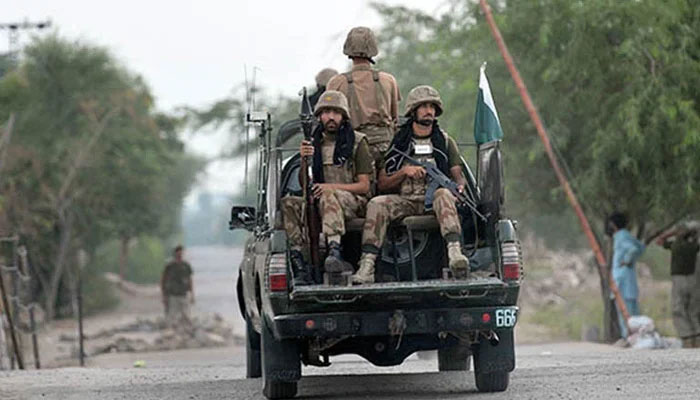Escalating terror
Country witnessed 432 violence-linked fatalities and 370 injuries among civilians, security personnel, and outlaws
Most Pakistanis are unaware of what it means to live in a safe country where there are no threats of terror attacks. In the early 2000s, after the American invasion of Afghanistan, the security situation in Pakistan worsened. An entire generation grew up amid deaths, destruction, and the never-ending sound of bombs. For about two decades, till 2019, Pakistan was constantly fighting with extremist elements operating across the country. But the relative calm that the country saw eventually disappeared in 2021 after the US withdrawal from Afghanistan. And since then the sound of bombs is back in Pakistan. In the first quarter of 2024, Pakistan saw 245 incidents of terror attacks and counter-terror operations, per a report by the Centre for Research and Security Studies (CRSS). The country witnessed 432 violence-linked fatalities and 370 injuries among civilians, security personnel, and outlaws. On March 26, five Chinese officials were killed in a suicide attack in Khyber Pakhtunkhwa. The beginning of the second quarter has been equally scary. Last week, five Japanese autoworkers narrowly escaped death after a suicide bomber attacked the car they were travelling in. This happened in Karachi, raising alarm bells about the possible return of terrorists in urban areas – not that the presence of militants in the peripheries is acceptable.
In a separate incident in DI Khan, at least three officers, including two Custom officials, were martyred after unidentified armed men attacked them. The series of violent attacks calls for authorities to draft a foolproof plan to put an end to this unrest in the country. In this context, on Monday, the ISPR announced killing at least 11 terrorists in DI Khan and North Waziristan districts. The freedom that most militants enjoy in neighbouring Afghanistan has had disastrous consequences for Pakistan. To its credit, Pakistan has been trying to engage the interim government in Afghanistan through talks. However, the Afghan regime has not taken any major steps to stop militants from using its soil for terrorist activities. Last week, security forces killed seven terrorists who were trying to infiltrate the Pakistan-Afghanistan border.
Last year, a study published by a local news outlet highlighted the role of social media in recruiting for militant groups. The study found the provocative material posted online by these groups to lure people into joining them. It is obvious that the terror threat is a complex problem, one that requires all stakeholders to work together. Pakistan’s domestic problems make it easier for external forces to spread anarchy in the country. Pakistani authorities need to tackle this issue on a priority basis. That so many people want to leave the country is not only linked to economic conditions here. People want to raise their families in an environment where their children can enjoy freedom of movement. Pakistan cannot afford to keep losing its bright minds. All measures must be taken to put an end to terrorism.
-
 Jennifer Hudson Gets Candid About Kelly Clarkson Calling It Day From Her Show
Jennifer Hudson Gets Candid About Kelly Clarkson Calling It Day From Her Show -
 Shamed Andrew Was With Jeffrey Epstein Night Of Virginia Giuffre Assault
Shamed Andrew Was With Jeffrey Epstein Night Of Virginia Giuffre Assault -
 Shamed Andrew’s Finances Predicted As King ‘will Not Leave Him Alone’
Shamed Andrew’s Finances Predicted As King ‘will Not Leave Him Alone’ -
 Bad Bunny Faces Major Rumour About Personal Life Ahead Of Super Bowl Performance
Bad Bunny Faces Major Rumour About Personal Life Ahead Of Super Bowl Performance -
 Sarah Ferguson’s Links To Jeffrey Epstein Get More Entangled As Expert Talks Of A Testimony Call
Sarah Ferguson’s Links To Jeffrey Epstein Get More Entangled As Expert Talks Of A Testimony Call -
 France Opens Probe Against Former Minister Lang After Epstein File Dump
France Opens Probe Against Former Minister Lang After Epstein File Dump -
 Last Part Of Lil Jon Statement On Son's Death Melts Hearts, Police Suggest Mental Health Issues
Last Part Of Lil Jon Statement On Son's Death Melts Hearts, Police Suggest Mental Health Issues -
 Leonardo DiCaprio's Girlfriend Vittoria Ceretti Given 'greatest Honor Of Her Life'
Leonardo DiCaprio's Girlfriend Vittoria Ceretti Given 'greatest Honor Of Her Life' -
 Beatrice, Eugenie’s Reaction Comes Out After Epstein Files Expose Their Personal Lives Even More
Beatrice, Eugenie’s Reaction Comes Out After Epstein Files Expose Their Personal Lives Even More -
 Will Smith Couldn't Make This Dog Part Of His Family: Here's Why
Will Smith Couldn't Make This Dog Part Of His Family: Here's Why -
 Kylie Jenner In Full Nesting Mode With Timothee Chalamet: ‘Pregnancy No Surprise Now’
Kylie Jenner In Full Nesting Mode With Timothee Chalamet: ‘Pregnancy No Surprise Now’ -
 Laura Dern Reflects On Being Rejected Due To Something She Can't Help
Laura Dern Reflects On Being Rejected Due To Something She Can't Help -
 HBO Axed Naomi Watts's 'Game Of Thrones' Sequel For This Reason
HBO Axed Naomi Watts's 'Game Of Thrones' Sequel For This Reason -
 King Charles' Sandringham Estate Gets 'public Safety Message' After Andrew Move
King Charles' Sandringham Estate Gets 'public Safety Message' After Andrew Move -
 Lewis Capaldi Sends Taylor Swift Sweet Message After 'Opalite' Video Role
Lewis Capaldi Sends Taylor Swift Sweet Message After 'Opalite' Video Role -
 Brooklyn Beckham Plunges Victoria, David Beckham Into Marital Woes: ‘They’re Exhausted As It Seeps Into Marriage
Brooklyn Beckham Plunges Victoria, David Beckham Into Marital Woes: ‘They’re Exhausted As It Seeps Into Marriage




